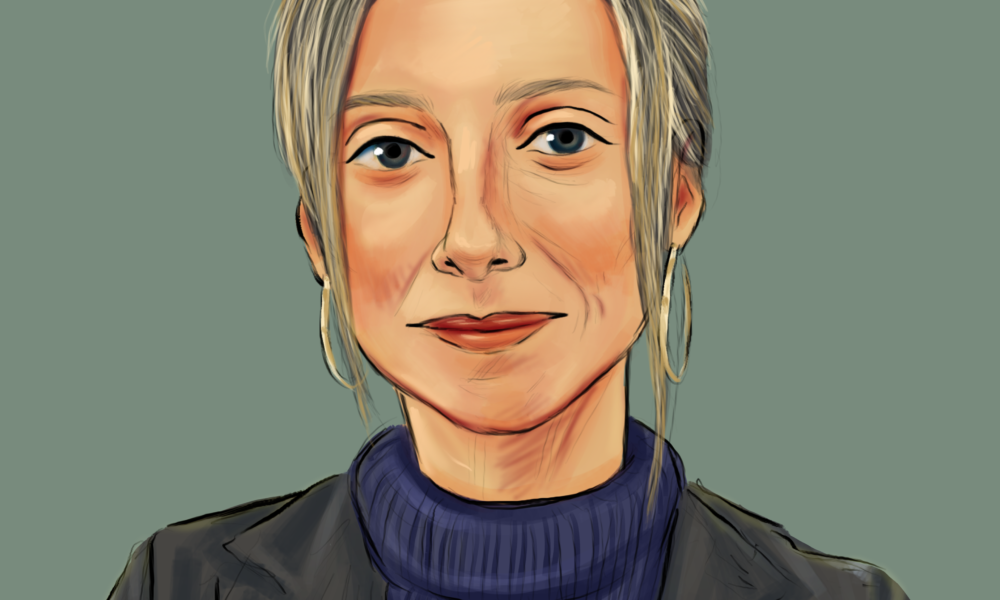Keffiyehs adorned the Students’ Society of McGill University (SSMU) ballroom on Nov. 4 as over 200 students, professors, and community members gathered for a presentation from Francesca Albanese, the United Nations (UN) Special Rapporteur on the Occupied Palestinian Territories. During the talk, Albanese discussed her Oct. 1 report on human rights in Palestine, which urged UN member states to take action, before fielding questions from the audience.
On Nov. 1, the McGill administration forced the organizers—Independent Jewish Voices McGill (IJV), RadLaw McGill, and Law Students for Palestine at McGill (LS4PM)—to change the event’s location multiple times. This occurred after Neil Oberman, a lawyer representing numerous McGill students and organizations such as local chapters of Chabad, Hillel, and Israel on Campus, sent a letter to McGill President and Vice-Chancellor Deep Saini and Dean of Law Robert Leckey threatening legal action if the university permitted Albanese to move forward with her talk on campus. It is unclear whether Oberman’s letter is the reason for the administration’s demands to organizers.
Organizers initially planned to hold the event in Room 101 in New Chancellor Day Hall with hired security, booking it two weeks in advance. However, the administration instructed organizers to reschedule the event to a later date or move it online, which LS4PM argued would disrupt the event. After receiving pushback from students and faculty, the administration relented but sought to move the event to a smaller venue which raised new security concerns.
In an interview with The Tribune, Sam,* an organizer with LS4PM, criticized Oberman and the administration’s response to the event for being unnecessarily punitive.
“[McGill’s interference] was shameful and unconscionable because any other UN Special Rapporteur with her profile would have been welcomed with open arms at the Faculty of Law. They would’ve rolled out the red carpet for this expert in international law,” Sam explained. “So we believe that this is once again symbolic of the ‘Palestine exception’ that actively contributes to the dehumanization of Palestinians.”
In a statement to The Tribune, McGill’s Media Relations Office (MRO) wrote that the original plan to host the event in the Moot Court created too great a risk, pointing to indications that there may be counter-protests, and the fact that there would be classes taking place nearby. They also stated that organizers were told not to include IJV in any promotional material because of their violations of McGill policies.
“The McGill administration informed the organizing group that IJV McGill had violated McGill policies to the detriment of members of the McGill community,” the MRO wrote. “Accordingly, for the event to proceed at McGill using McGill resources, “IJV McGill” had to be removed from promotional materials, including on social media.”
A representative from IJV who wished to stay anonymous stated that they believe the administration has not provided concrete evidence of any policy violations.
On the day of the talk, as the organizers sought an alternative location to hold the event, they reached out to the SSMU, who permitted them to book the ballroom in the University Centre.
Following a 40-second standing ovation from the audience, Albanese began her talk with a land acknowledgement. She then outlined the three conditions for genocide she identified in her recent report on the current status of human rights in Palestine: Killing, causing serious bodily or mental harm, and creating conditions of life calculated to bring about the physical destruction of a group.
Albanese called for the audience to recognize that Israel’s ongoing violence in Palestine falls under the category of genocide. She also highlighted the responsibility of nations to abide by the International Court of Justice’s 2024 Advisory Opinion, which holds all nations responsible for taking the necessary actions to dismantle the occupation.
“[The UN General Assembly states that] by September next year, Israel needs to withdraw the troops and dismantle the settlements. This is the requirement according to international law,” Albanese explained. “Is Canada aiding and assisting the occupation, yes or no? Because if the answer is yes, Canada is violating international law.”
An audience member challenged Albanese during the talk’s question and answer session, referring to an interview with France 24 in October 2024, where she described the killing of Hamas leader Yahya Sinwar as “inhumane.” This prompted the audience member to ask Albanese whether she thinks her UN role might be better served by someone who is not “so blatantly anti-Jewish.”
Albanese responded with a swift, “No.”
She then asserted that the audience must not conflate criticism of Israel with antisemitism.
“My personal criticism of Israel would be there if Israel was led by a Muslim or a Buddhist or a Christian [….] If we are here counting the deaths and the victims only on the ground of religion, it will never end,” Albanese said.
In an interview with The Tribune, Lola Milder, U3 Arts, shared that she attended the event in hopes of learning more about how students can disrupt institutional complicity in injustice.
“It’s really valuable to have [Albanese’s] sources and evidence to refute institutions like McGill that try to dismiss protests […] and have adopted a fake neutrality that is really a support of Israel,” Milder said.
Albanese’s concluding words urged attendees to continue the fight against colonialism.
“I hope that all of us remember the spirit of the encampment, that serves as a testament to humanity,” Albanese said. “Fight colonial amnesia and confront its legacy and struggle both on this land and in Palestine.”
*Sam’s name has been changed to preserve their anonymity.








